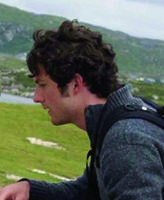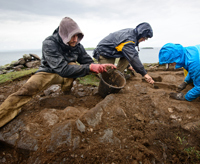
I remember reading the description for the anthropology major at Notre Dame kind of like you remember meeting a good friend for the first time.
It was the summer before my freshman year, and in retrospect, I cannot recall the moment without a musical cue in the background heralding the significance of the moment. I can claim little credit for the great experiences I have had since, for it has without doubt been the support and encouragement of faculty members of Notre Dame’s Department of Anthropology that has made it possible.
Professor Ian Kuijt taught my first introductory course in anthropology. I was struck by the theoretical ambition of the discipline and its disregard for boundaries. This was a holistic approach to patterns of human continuity and difference across time and space that questioned fundamental assumptions about how the world works and what it means to be a person within it.
Personally enlightening, it also offered a framing for my interest in the medieval world that made the past relevant in a way I had not appreciated before.
Dr. Kuijt invited me to participate in his archaeological fieldwork that summer, the Cultural Landscapes of the Irish Coast (CLIC) project. I have stayed on the project for the last six years, and it has been a hugely rewarding experience.
 Ryan Lash '10 and team members excavate the area around Chochan Leo, a medieval shrine in Ireland. Photo by Matt Cashore/University of Notre Dame.
Ryan Lash '10 and team members excavate the area around Chochan Leo, a medieval shrine in Ireland. Photo by Matt Cashore/University of Notre Dame.
Not only have I have made friends among the locals where we work, I have also presented our findings at multiple academic conferences and continued to build on our research in the area. I am currently in the first year of a Ph.D. program at Northwestern University where I am developing a research project that expands on CLIC’s investigations of early medieval monasticism and pilgrimage.
From my first involvement in the department, Dr. Kuijt and Dr. Meredith Chesson have been tireless advisors and friends. They helped me to construct and secure funding for two independent research projects as an undergraduate, supported by Notre Dame’s Nanovic Institute for European Studies and the College of Arts and Letters’ Undergraduate Research Opportunity Grant program, as well as another pursued as an M.Phil. degree through the Gates Cambridge Fellowship. And, with their continued guidance, I was lucky enough to secure a National Science Foundation Graduate Research Fellowship to help fund my Ph.D. dissertation.
The department’s faculty has made similar opportunities available for a lot of students working within anthropology and more broadly in the sciences and humanities. This active encouragement of undergraduate research has to be one of the department’s greatest virtues.
No matter what field students eventually pursue, it offers valuable personal and intellectual experiences.
For undergraduates aspiring to graduate study—in anthropology or any other field—it affords a distinct advantage over their peers.
The Department of Anthropology’s focus on undergraduate research, and the efforts of Dr. Chesson and Dr Kuijt in particular, meant that I could apply to Ph.D. programs with some experience designing and conducting the kinds of research projects many applicants are hoping to pursue for the first time.
Holism is the strength of anthropology as a discipline, and the faculty’s diversity of interests and methods is a strength of Notre Dame’s department in particular. I have always been impressed by the faculty’s attentiveness to interested students, and there’s a lot of people grateful for them.
I am one of those people.
Learn More >
- Related story: Senior Ryan Lash to Receive Gates Cambridge Scholarship
- Related story: Abandoned Irish Island Offers Window to the Past
- Notre Dame magazine feature on Cultural Landscapes of the Irish Coast (CLIC) project
- Video on CLIC
- Ian Kuijt faculty page
- Meredith Chesson faculty page